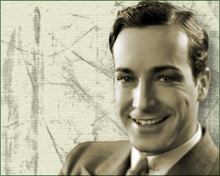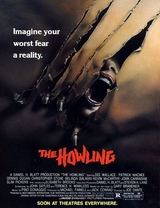Our editor-in-chief Nate Yapp is proud to have contributed to the new book Hidden Horror: A Celebration of 101 Underrated and Overlooked Fright Flicks, edited by Aaron Christensen. Another contributors include Anthony Timpone, B.J. Colangelo, Dave Alexander, Classic-Horror.com's own Robert C. Ring and John W. Bowen. Pick up a copy today from Amazon.com!
David Manners
David Manners was born Rauff de Ryther Daun Acklom in Halifax, Nova Scotia on April 30, 1901 (although accounts of his birth year vary from 1900 to 1905). At sixteen, Manners made his stage debut in a high school production of William Shakespeare's The Tempest. After receiving his B.S. in Forestry from the University of Toronto, he joined Basil Sydney's Touring Co.. When he wasn't acting, he held down odd jobs around the United States and in Canada, before finally settling in Hollywood in 1930.
Beginning his movie career with James Whale's Journey's End (1930), Manners went on to starring and supporting roles as the guileless romantic lead in a number of films over the next six years, most memorably in three horror films he made for Universal Pictures between 1931 and 1934: Dracula (1931), The Mummy (1932), and The Black Cat (1934). In these movies, Manners took third billing, playing the disbelieving young man who attempts to protect his girlfriend/fianceé/wife from the forces of evil, even if he has to be convinced of that evil by an older, wiser gentleman. On Tod Browning's Dracula, only Manners' eighth film, he commanded $2000 a week, four times the salary of top-billed Bela Lugosi. Despite the fame and critical platitudes that the film garnered, Manners would later claim to have never seen Dracula even once.
In Karl Freund's The Mummy, Manners played largely the same role as he had in Dracula, this time fighting Boris Karloff's ancient Egyptian wizard. In Edgar G. Ulmer's The Black Cat, he teamed up with Lugosi against Karloff. In Ulmer's film, Manners was allowed more action, wielding a gun and getting into fist fights.
Manners' non-horror career was equally impressive, at least in terms of who he worked with. Frank Capra, George Cukor, and Rowland V. Lee all directed him at one point or another. He starred opposite such names as Katherine Hepburn, Carole Lombard, Barbara Stanwyck, Loretta Young, and Claudette Colbert. However, Manners was not entirely comfortable with the Hollywood lifestyle and in 1933, he began shifting his attentions to his ranch in the High Mojave Desert.
Stuart Walker's The Mystery of Edwin Drood (1935), a Universal production, was the last horror film of Manners' career. Despite playing the titular Drood, he was billed fifth, his credit appearing underneath those of Claude Rains, Douglass Montgomery, Heather Angel, and Valerie Hobson. This was a signpost in the decline of Manners' career. Where once he easily slipped into third, second, or even top billing in major studio productions, now he mainly saw such credits working for poverty row firms like Majestic and Republic Pictures.
In 1936, after appearing opposite Katherine Hepburn in A Woman Rebels, Manners retired from film. He focused instead on stage acting and a burgeoning career as a writer. He published two novels in the 1940s, "Convenient Season" and "Under Running Laughter." He appeared in numerous plays through the 1940s and 1950s, before retiring from acting entirely. From the late 1950s onward, Manners pursued spiritual enlightenment, eventually publishing books on his own philosophical views regarding the state of reality. In his 80s and 90s, he took up oil painting, working largely in abstracts. David Manners died at age 97 on December 23rd, 1998 in Santa Barbara, CA.
Sources:
Norris, John. "David Manners Biography". The Life and Films of David Manners. 7 Jan 2007. The David Manners Website. 25 May 2007. <http://www.davidmanners.com/biography.html>.
Skal, David J.. Hollywood Gothic: The Tangled Web of Dracula from Novel to Stage to Screen. Faber & Faber, 2004.








